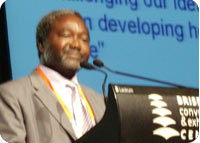 |
Reporting from Medinfo in Brisbane, Australia, EHI’s contributing editor, Neil Versel interviews the World Health Organisation’s e-health co-ordinator.
Is the International Medical Informatics Association (IMIA) misnamed? “I think it’s time to replace the name ‘Medical’ with ‘Health’ in the organisation,” suggested Dr S. Yunkap Kwankam, e-health co-ordinator for the World Health Organisation.
“If we look at what makes people healthy, it’s a lot more than medicine.” It takes environmental factors, lifestyle choices and, indeed, know-how, Kwankam told delegates to MedInfo, IMIA’s 12th international congress on health informatics, Wednesday in Brisbane, Australia.
The World Health Organisation (WHO) Constitution, written in 1946, mentions the importance of knowledge in health, but those who drafted that document could not have imagined the potential for information and communications technologies to deliver health knowledge worldwide, according to Kwankam. “My basic thesis is that ICT can contribute in the area of information, and, more specifically, knowledge,” he said.
To this end, the WHO and IMIA took the occasion of MedInfo to announce a new collaboration. “The trajectory of e-health in this organisation hasn’t had the profile it has now,” Kwankam explained.
Though IMIA already has privileged status within the WHO (as a certified non-governmental organisation, IMIA has the right to ask for the floor during WHO assembly meetings – something no other informatics group is privileged to), Kwankam made clear that the goal is to “revitalise that relationship”.
Over the next three years, IMIA and the WHO will emphasise the Global Observatory for eHealth, developing a health informatics workforce and sharing intellectual property. The Global Observatory for eHealth, established by the WHO in 2005, is a clearinghouse for best practices, “to better understand the e-health space in countries around the world,” Kwankam said.
The WHO has had a five-pronged e-health strategy since 2005:
1. To strengthen health systems worldwide.
2. To promote public-private ICT research partnerships.
3. To support the building of e-health infrastructure.
4. Encouraging standards development and use.
5. To promote a greater understanding of health ICT.
In e-health, the WHO often works as a convenor to bring people and projects together. As Kwankam noted, the 8,000 worldwide employees of the WHO can’t possibly serve the health needs of 6bn people. As such global health depends on an informed populace and, of course, health professionals. But the world faces a shortage of healthcare personnel, particularly knowledge workers.
“It’s clear that this is a limiting factor in the development of e-health programmes,” said Dr. Antoine Geissbuhler, IMIA’s liaison to the WHO. Geissbuhler, chief of medical informatics at Hôpitaux Universitaires de Gèneve in Switzerland, says IMIA is interested in the American Medical Informatics Association’s “10×10” scheme, in which the US affiliate aims to train 10,000 health informatics professionals by 2010.
Geissbuhler went on to say that internationally, the issue is more than just training, but also of brain drain, as migration of informatics professionals to rich, Western urban centres threatens e-health progress in developing nations.
Kwankam sees great potential in telehealth services. “Access to care had been dependent on face-to-face contact,” he said. “We don’t have to have that anymore.”
Programmes have to do more than just purchase computers and software. “Just piling technology in there will not make up for other problems,” Kwankam said.
Long-term, incoming IMIA president Dr. Reinhold Haux, director of the Institute for Medical Informatics at Technical Institute of Braunschweig, Germany, wants the informatics group to motivate its member societies around the world to develop their own e-health programmes. Kwankam seconds these thoughts, “The work to be done to bring ICT to bear in countries can’t be done by countries alone or by industry alone,”.
Kwankam said the WHO is helping to develop a healthcare knowledge base by “learning through doing.” For example, the WHO attempted to get 3m HIV/AIDS patients on anti-retroviral therapy by 2005. Though effort fell short, the data collection helped discover that ARV programmes had been happening in isolation, and now steps are being taken to bring them together.
He also talked of a “growing know-do gap,” which he described as “the gulf between what’s known in science and what we actually do in medicine and practice.” For example, despite the existence of low-cost vaccinations, 11m child deaths still occur every year, 7m of which could be prevented with cheap interventions, he said, citing a 2003 study. ICT could help iron out some of the logistical challenges.
Noting that patient out-of-pocket health costs make up a greater proportion of total health spending in low-income countries than in richer lands, Kwankam said, “I tell my colleagues that the technology is at its best when it serves a higher purpose. I think it’s time we armed them with information…arm the individual with information and we’ll have a revolution.”
Not everybody has access to the Internet, so Kwankam believes the future is in mobile communication. He said that 30 Red Cross volunteers in Ghana were able to conduct 2,400 health surveys in a three-day period thanks to personal digital assistants. With pen and paper, they would have only been able to complete 200 surveys in that time.
Kwankam cited additional examples of small-scale health ICT efforts in underserved regions, but there has been no true global revolution to date, so IMIA and the WHO have a tall task ahead of them over the next three years.
The two organisations plan to report on their efforts at MedInfo 2010, in Cape Town, South Africa, which itself will represent a bit of a revolution. “Cape Town is a symbol. It is the first time we have had an international medical informatics congress in Africa,” said Haux.
Link: Global Observatory for eHealth http://www.who.int/kms/initiatives/ehealth/en/
